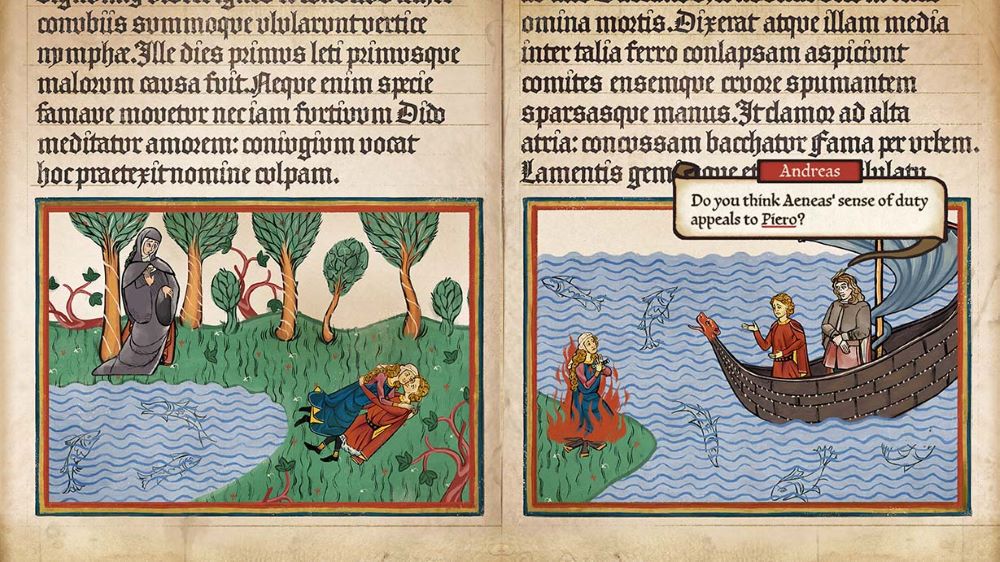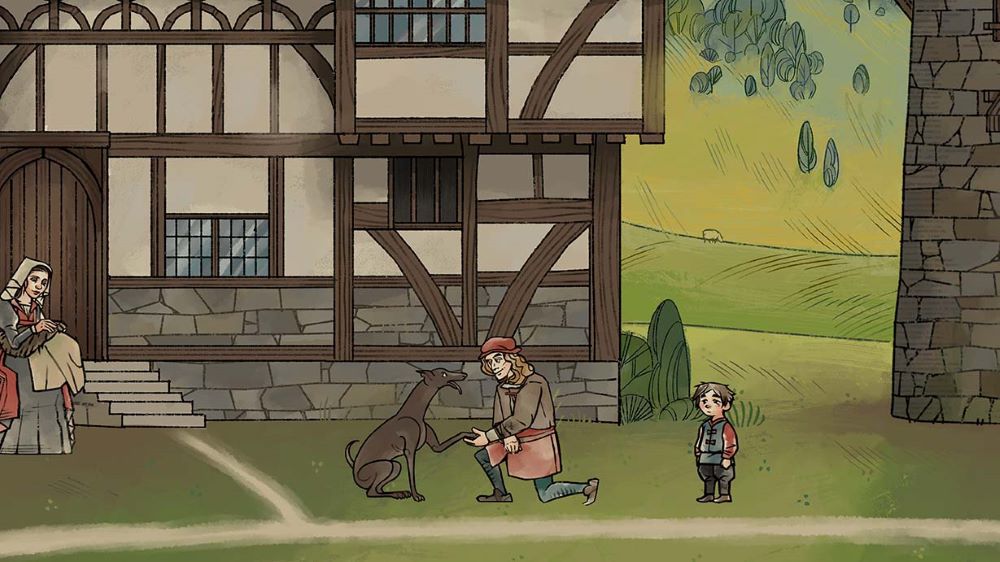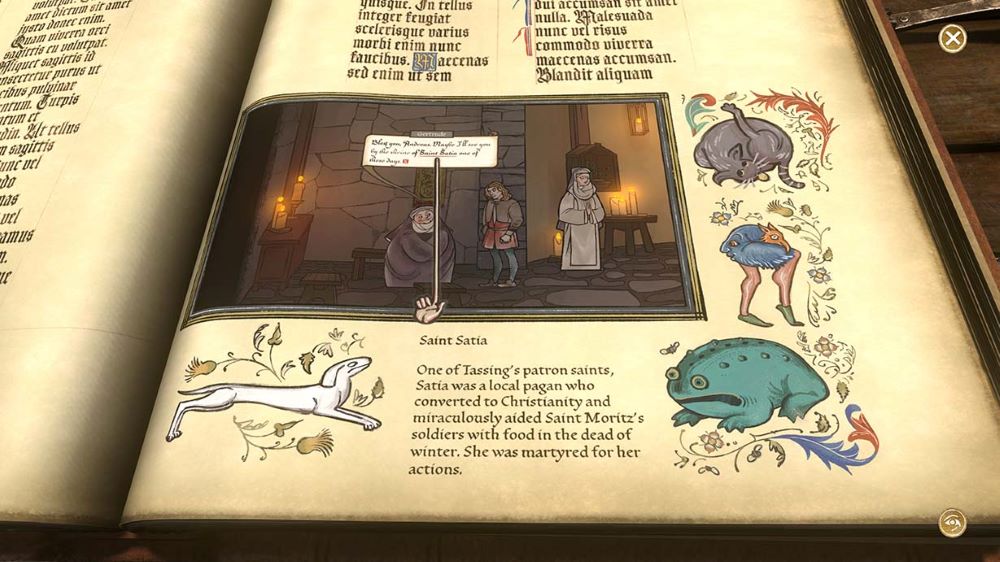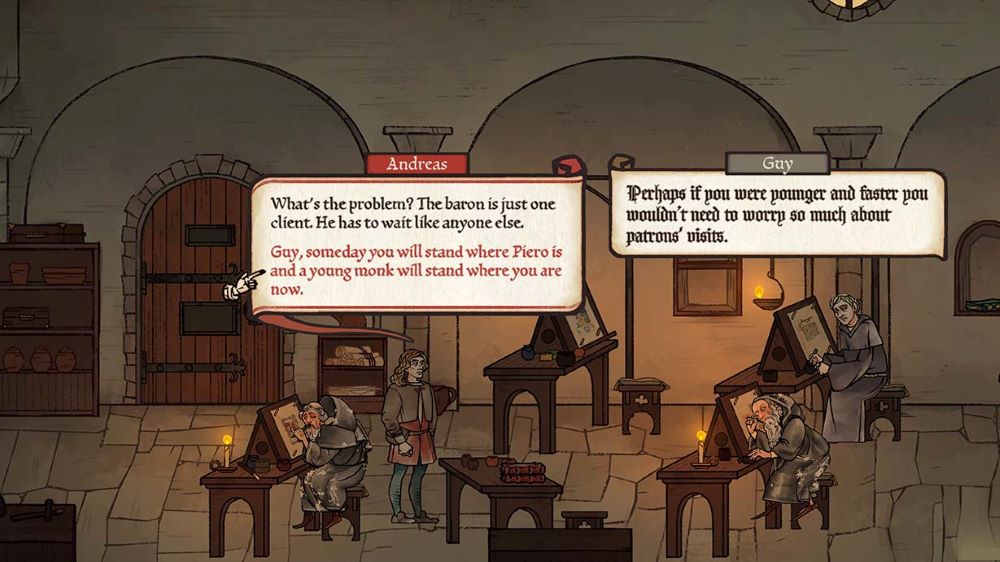Our review of Pentiment, developed by Obsidian Entertainment. Available now for PS5 (reviewed), PS4, Xbox X/S, Xbox One, Windows, and Switch.

WHAT IS IT?
A Medieval-themed 2.5D mystery RPG, which is way less dorky than that sounds.
IS IT GOOD?
It’s exciting in its own little oddball way.
WHO SHOULD PLAY IT?
Anyone who loved the criminally underrated Return of the Obra Dinn and/or the delightfully bizarre output of Umberto Eco.

MEDIEVAL TIMES
Andreas Maler is in trouble.
The year is 1518, and the German artist, recently arrived in the town of Tassing, has gotten mixed up with some monks from the nearby Benedictine Kiersau monastery. (Both Tassing and Kiersau are fictional, but inspired by real-world locales of the 16th century.)
Bodies are starting to pile up at the abbey and across town, and Maler – probably against his better judgment – has decided to involve himself in solving these murders, in a story which brings to mind both Umberto Eco’s 14th century Benedictine murder mystery The Name of the Rose and, more recently, narrative adventure games like Disco Elysium, Night in the Woods, and Return of the Obra Dinn.

ALBRECHTIAN
Pentiment is an odd game. Once you get past its Flash-era graphics, it slowly reveals itself to be an intuitive, deeply researched mystery that understands – and largely avoids – the pitfalls of such text/story-driven games. Pentiment is rarely, if ever boring, and it rarely, if ever, offers up easy answers or the kind of binary good/evil choices that lesser games resort to.
Across its fifteen-to-twenty hour narrative, it also demonstrates its lead designer Josh Sawyer’s unabashed love of historical fiction, and his team’s commitment to a believable story-driven adventure rooted in a very specific era probably better known for its Monty Python jokes. Pentiment, with its woodcut aesthetic – illuminated manuscripts abound – and wonderful early music soundtrack recorded by the Alkemie Early Music Ensemble, is also that exceedingly rare case of an authentic Medieval game that’s neither Assassin’s Creed nor real-time-strategy.
Most importantly, Pentiment is compelling. Each section of the game introduces a new mystery or mysteries to solve, with compelling reasons to do so. Interestingly, mysteries are all time-limited, thanks to a unique gameplay structure that effectively cuts off certain avenues of investigation once you choose to pursue a particular lead. While this can occasionally make the resolution of certain “cases” disappointing – particularly when it becomes clear you missed an important clue somewhere – most of the time it serves to encourage you to work fast, and work smart.
It reminds me, in a roundabout way, of the criminally underrated Deadly Premonition, the self-proclaimed Twin Peaks of video games in which events proceed in real-time in that game’s fictional small-town setting. Take too long driving from one point to the next in Deadly Premonition, you can genuinely miss an entire plot sequence. Similarly, choose to investigate that farmhouse over this hidden chamber in Pentiment, and you will be forced to reckon with the consequences.

THE MYSTERY OF THINGS
Proper mystery games are few and far between. In addition to the aforementioned, we at the Toronto Guardian also have a soft spot for the likes of L.A. Noire and The Forgotten City, the latter a similar “period piece mystery”. And while a lot of such games boil down to item hunts, Pentiment largely resists the urge to make the player go chasing things from screen to screen, instead relying on the nuance of contextual conversation and a robust detective’s notebook – very similar to Obra Dinn – in which to keep track of everything. The game trusts you, the player, to help Andreas, the protagonist, figure out what’s happening, which characters are lying, and who’s hiding something.
Arguably where Pentiment falters is in its lengthy runtime. Fifteen hours is a lot of time to spend piecing together a dizzying array of mysteries, and the fact that most of the storylines are depressingly bleak only makes it that much harder to push on as time goes by. You will push on, because you’ll want to see how the narrative plays out, but this is definitely a game that could have used a good edit, or perhaps been broken up into instalments. Obra Dinn was about eight hours; Forgotten City took about six to see its multiple endings through. Pentiment‘s fifteen is longer than those two combined, and it eventually starts to show.
But that’s hardly a condemnation of an otherwise stellar experience, one that is keenly aware of player expectations and of the limits and advantages of video games as an interactive medium. Pentiment, which according to developer Obsidian means “a reappearance in a painting of an original drawn or painted element which was painted over by the artist”, is an apt term for this game which, hour after hour, slowly reveals itself to be something so much more than the cheeky Flash-style graphics the player first encounters.
***
Final score: 9/10 Albrecht Dürer drawings.
Visit the official website for Pentiment here.



